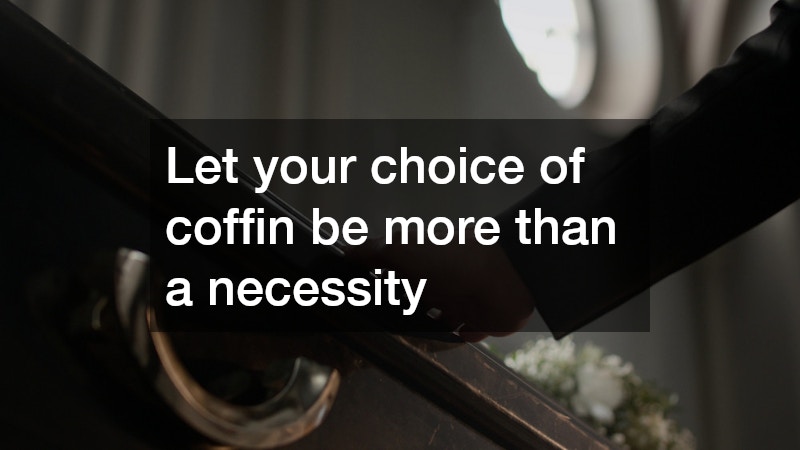
How to Choose the Right Coffin for a Loved One
Choosing how to honour a loved one after their passing is a deeply personal decision. Among the many considerations, selecting the right coffin can feel overwhelming during a time of grief. This choice represents a meaningful gesture of respect, and understanding the options can help bring clarity during a difficult moment.
Whether guided by tradition, values or practicality, this process can be made more manageable with the right information and support.
Materials & Construction
One of the first decisions families often face is what type of material to choose. Timber remains a common option, with varieties like pine, oak and mahogany offering different looks and price points. Metal, though less widely used, provides a more durable option. For those wishing to minimise their environmental footprint, biodegradable alternatives such as wicker or reinforced cardboard are also available.
The construction quality is essential. Look for strong base support, secure handles and well-fitted linings to ensure both dignity and safety. Always confirm that the product meets the necessary standards for cremation or burial, especially if there are transportation needs involved.
Shape, Style & Personal Expression
Shapes can range from traditional rectangular boxes to curved, stylised forms. While some families prefer simplicity, others might choose a more decorative finish or personalised embellishments. Options such as engraved plaques, printed imagery or customised linings allow loved ones to create a fitting tribute.
Colour, texture and detailing can also reflect the personality or preferences of the deceased. Many providers offer guidance on balancing meaningful design with practical considerations like service type and cost. Families may also incorporate cultural motifs, hobbies or favourite colours to honour individuality and create a farewell that feels deeply personal, rather than purely conventional or generic in presentation.
Budget Planning & Cost Factors
Cost is often a concern, and it helps to set a clear budget early. Prices vary significantly depending on material, craftsmanship and extras such as decorative trims or interior fabric. Some funeral homes offer bundled packages which may reduce costs, though it’s wise to request itemised quotes to understand what’s included.
Ask questions before committing. Clarify what’s required, what’s optional and what the final price covers. Taking the time to understand your options ensures a thoughtful choice that respects both the deceased and your financial circumstances. Comparing offerings between providers and identifying where quality matters most can help you stay within budget without compromising on the dignity of the farewell.
Cultural & Religious Needs
Faith and culture play an important role in end-of-life decisions. Certain traditions may call for simplicity, particular materials or specific burial practices. Others may have preferences around symbolic elements or positioning.
It’s vital to consult with religious leaders or community advisors, especially when dealing with customs that involve unique requirements. Funeral directors with cultural experience can also help ensure that practices are followed respectfully and correctly. Understanding these customs ahead of time allows families to avoid delays and ensures that the final arrangements uphold deeply held beliefs with accuracy, care and consideration for heritage.
Eco-Friendly Alternatives & Sustainability
For those who valued nature or lived sustainably, environmentally conscious options are increasingly available. These may include containers made from recycled materials, untreated wood or plant-based adhesives.
It’s important to ensure that any chosen option aligns with local cemetery or crematorium guidelines. Natural burial grounds, in particular, may have strict conditions regarding materials and decomposition rates. Discuss these preferences early so arrangements can be made without complication. Additionally, some providers offer certifications or third-party verification for eco-friendly choices, which helps families make informed and authentic decisions that reflect environmental values.
Support from Funeral Providers
Trusted funeral providers play a key role in helping families through this process. They should offer clear, honest advice without pressure and explain all options in plain terms. Good providers also allow time for decision-making and support families through the necessary paperwork and logistics.
Reading reviews or asking for recommendations can be helpful in choosing a provider. Transparency in both cost and process is key to ensuring you feel confident and supported throughout. A compassionate provider will also coordinate with religious or cultural advisors, guide transportation arrangements and assist with permits or certificates, relieving much of the emotional and administrative burden on loved ones.
Transportation & Practicalities
If the burial or service is taking place away from where the person passed, certain requirements must be met for transportation. The selected container must comply with safety standards and size limits, especially if travel involves flights or long distances.
Check with your funeral director about these needs in advance. This helps avoid any delays or last-minute adjustments, especially if timing is sensitive due to scheduled services or cultural rituals.
While this decision may feel daunting at first, selecting the right coffin becomes simpler when approached with care and clear priorities. By focusing on what mattered most to your loved one — whether that’s tradition, sustainability, design or simplicity — your choice becomes a powerful act of love and remembrance.
There is no one-size-fits-all solution. The most important part is that the decision reflects respect and dignity. With compassionate guidance and a thoughtful approach, the process can offer a sense of closure, peace and meaning in farewell.
Let your choice of coffin be more than a necessity — let it be a final gift that speaks to the life lived and the love shared.



